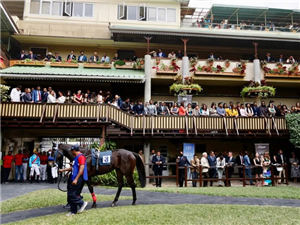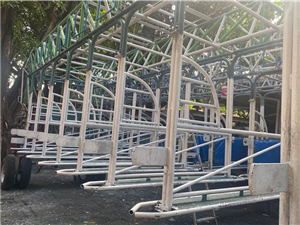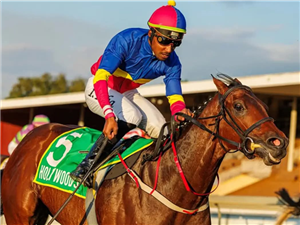Born in Subiaco on 20 February 1920, Robert Howie Pollock dropped his second initial to avoid confusion with his Scottish immigrant father who had the same given names.
R H Pollock was one of the first drivers to be licenced in Perth and both rode and drove some 54 winners in the Perth Metropolitan area at tracks as varied as Claremont, the WACA Ground, Midland Junction and Guildford between 1912 and 1927.
His son Bob Pollock began driving in 1939 and drove the first of 854 winners on the then 15yo gelding Tommy Dillon on 12 August 1939. He was only four years older than the horse and was having just his third drive in a race.
Just 20 days after driving his first winner the German Army invaded Poland, and the second World War started.
Pollock drove a further two winners shortly before enlisting, like so many others, in the Australian Army in November 1940.
Pollock was a member of the 5th Australian Army Veterinary Hospital based at Fairlawn Stud Farm in Herne Hill, and as a blacksmith Pollock reached the rank of Sergeant before his discharge in January 1945.
After the war and working as a blacksmith, Pollock first came to notice as the trainer and driver of the smart mare Battle Song which won ten races at Gloucester Park and Richmond Raceway including a heat and final of the £1000 1950 Fremantle Cup and a heat and final of the £2000 Easter Handicap.
The 1953 Inter Dominion was the first to see the arrival of horses by plane for the Championship with the defending champion Avian Derby, the first horse to set foot on the tarmac at Guildford Aerodrome when a Bristol freighter arrived in Perth at 5:30pm on January 29, 1953.
Also on that plane were his stablemates Avondale and Star Music and the champion New Zealand mare Blue Mist.
In Perth that year was the 1950 Inter Dominion winner Captain Sandy, by now a 10-year-old and in the care of Dinny Nolan. Nolan had bought Captain Sandy at a time when most thought the gelding was well past his prime.
Nolan then further confounded the experts when he headed west on a 2900km road trip in a single float to take on the best horses in the Southern Hemisphere.
The Adelaide-Perth trip took a week in searing summer temperatures on a "road" that was little more than a couple of wheel ruts through the dirt.
Nolan had trained successfully in Perth in the 1930s before moving to Adelaide and later Melbourne.
WA fans were eagerly awaiting the clash between the local four-year-old champion and public idol Beau Don and the star Sydney four-year-old Ribands.
Beau Don had started just 18 times for 13 wins and three seconds. His lack of experience was notable when compared to the 37 races won by Ribands to that point. Beau Don was a brilliant winner on the opening night, as was Ribands, which also won on the second night.
Captain Sandy had been driven by legendary New Zealand horseman Freeman Holmes in the three rounds of heats. However, Holmes decided to drive the champion mare Blue Mist in the final after qualifying both horses.
Pollock was quickest to realise that Holmes would drive the more fancied Blue Mist in the final and, urged on by a well-meaning mate, he approached trainer Dinny Nolan and was given a trial drive behind Captain Sandy.
It is history now that Pollock became the youngest driver of a Inter Dominion Grand Final winner, piloting the 33/1 chance to a narrow victory over Ribands and Kellett in front of a crowd of more than 40,000 in track record time. Some estimates put the crowd at more than 60,000.
The on-course tote turnover of £60,000 was a new record and the 20,000 racebooks, ordered on a basis of one for every two patrons, sold out before the second race at the meeting.
Ribands had been sent out as a 6/4 favourite, and it took a track record from Captain Sandy for him to beat the Sydney champion.
With a lap to travel Ribands still led but the Victorian mare Dainty Rose, which had been trailing Ribands, began to tire and Fred Kersley quickly switched Kellett to the mare's outside and made his dash at the leaders.
In the struggle to obtain the vital position behind Kellett as he raced to the front Pollock beat legendary New Zealand reinsman Freeman Holmes (Blue Mist) to the position and Captain Sandy was able to trail Kellett who was unable to get past Ribands and Pollock was able to swoop on the pair in the closing stage and dash to the front.
Captain Sandy's win took his earnings to £38,000 and the honour of Australasia's richest standardbred. Nolan then loaded his champion into his single float and headed back to Adelaide.
Pollock may have been a little unlucky not to have won a second Inter Dominion.
Binshaw won his first race as a 3yo race at Bunbury on the 8th January 1965 and after a further country win he was sold to a syndicate of Perth owners for 2000 guineas, given a lengthy spell and then transferred to the stables of Bob Pollock.
Pollock won a couple of city races with Binshaw before sending the gelding for a spell.
When the now 5yo resumed in December 1966 he was in the stables of Phil Coulson and nominated for the 1967 Inter Dominion at Gloucester Park which he duly won in a cakewalk.
While Bob Pollock never won Perth Driver's Premiership he finished in the top three five times between 1959/60 and 1968/69 behind previous Hall Of Fame inductees Phil Coulson, Jim Schrader, Lyle Lindau and Max Johnson.
It was a similar with the Perth Trainer's Premiership as Pollock was three times runner-up and third three times without ever topping the list.
His list of Pollock's feature race wins, in addition to his Inter Dominion triumph, included the 1952 and 1953 Easter Cups with Doctor Ted and Blue Mist.
This was at a time when the Easter Cup was ranked second only to the WA Pacing Cup on the Perth calendar and carried a stake of £3500 which ranked it ahead of the £2000 A G Hunter Cup in terms of Australian feature races.
When she won the Easter Cup Blue Mist smashed Captain Sandy's two-mile record at Gloucester Park and established a New State Record rate of 2:08.0.
Blue Mist obliterated the Easter Cup field and at the two furlong mark she was some 60 yards clear and was eased down by Pollock in the home straight to win by an official margin of 40 yards from Hasty Nelson and Kellett.
Pollock trained and drove Battle Song to win the 1950 Fremantle Cup and won the 1969 WA Derby with the filly Hill Oro for trainer Aub Nelson.
Only two other fillies have won the WA Derby since 1970 in Via Vista and Whitbys Miss Penny.
In 1983 Pollock won a heat of that year's Golden Nugget with Preux Chevalier for trainer Barry Perkins who was suspended. Pollock was also at the reins when the stallion finished third in the final behind Classic Garry and Wondais Mate.
He won a second race for Perkins with Preux Chevalier in 1984.
In 1985 Pollock was forced from the sulky as he reached the then mandatory retirement age of 65 and he didn't drive for 12 years.
When the anti-discrimination laws changed in the late nineties Bob Pollock returned to race driving as a 77yo and won a couple of races driving the appropriately named Worth The Wait.
Had Pollock remained active in harness racing for each of those years there is no doubt he would have passed both the 1000 career wins and 500 Perth wins milestones.






